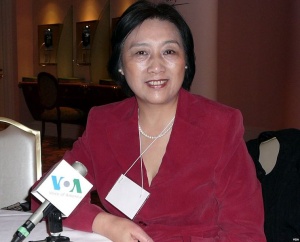Gao Yu
来自China Digital Space
高瑜

Your sentencing can destroy my health but it can’t destroy my spirit […] I believe China’s history will declare me innocent.
—Gao You, 1994
Gao Yu, born in Chongqing on February 23, 1944, is a journalist and dissident who has been repeatedly imprisoned for her writing and for her alleged sharing of state secrets. Since being released from prison for medical reasons and seeing her sentence reduced in November 2015, Gao continues to be subjected to heavy surveillance and interference.
At the start of the Cultural Revolution in 1966, Gao was attending Beijing's Renmin University, where she majored in literary theory. Ding Zilin, a former teacher of Gao's, told the South China Morning Post of Gao's risky decision to warn her of Red Guards' plans to publicly denounce and abuse her, and her subsequent allowing Ding to flea the city. "Fifty years on, she still has the same character. She hasn't changed," Ding told the SCMP in 2015, after Gao's most recent arrest.
Gao began her journalism career in 1979 or 1980 as a reporter for China News Service (中国新闻社), China's second largest state news agency. Her early role in state media allowed her to make contacts with powerful political elites. As a freelancer, she published widely in Hong Kong, Taiwan, and overseas Chinese outlets, becoming widely known among the Chinese diaspora. In 1988, she became deputy editor-in-chief at Economics Weekly (经济学周报), a liberal, reform-minded publication. In November 1988, then-mayor of Beijing Chen Xitong labeled Gao a "people's enemy" for one of her articles on political reform.
In the summer of 1989, Economics Weekly began covering the growing pro-democracy movement that would coalesce with the government crackdown on protesters in Tiananmen Square, taking an editorial stance which urged resolve between the government and the protestors. Gao was arrested on the morning of June 3, just hours before the crackdown began. An article she had written the year prior was described by then mayor of Beijing Chen Xitong as a "political program for turmoil and rebellion," and he labeled Gao a "people's enemy." Economics Weekly was ordered to shut down days later. She was released due to poor health after 15 months in custody.
As she was preparing to begin a fellowship at Columbia University, Gao was detained again on October 2, 1993. She was sentenced to six years in prison in 1994 for leaking "state secrets" with a pro-Beijing newspaper based in Hong Kong. Gao was barred from publishing in China. During her second imprisonment, she was awarded the 1995 World Association of Newspapers’ Golden Pen Award, the International Women’s Media Foundation’s Courage in Journalism Award (which she accepted over a decade later), and became the first journalist to win the UNESCO/Guillermo Cano World Press Freedom Prize. She was again given early parole for poor health in February 1999, eight months prior to the end of her initial sentence.




